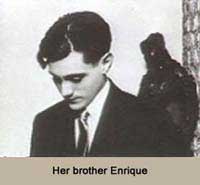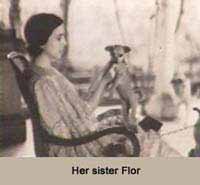

| Page [1] [2] [3] [4] [5] |
With her sister and brothers, she and her husband maintained a very select social circle focussed on the arts. Several of her friends remember attending salons in her home when they were teenagers; they say that she created a special world. Although still not famous in Cuba among the general population, her work was prized by “those in the know” in Cuban literary circles before the Communist Revolution.
Dulce María felt that she and her family created a magical world, beginning when she was a small child.
{Video Link: Special World}




Pedro Simón also spoke of Dulce María's adult cultural world as a special universe.
{Audio Link: Simón - her marriage to Pablo}
Playwright Miguel Barnet, another very old friend, was part of that special world.
{Audio
Link:
Barnet
- her salons}
The social eminence of Dulce María and her family affected her
literary work in unusual ways. For instance, she mischievously recounted
for Havana television the story of the approval of the great poem, “The
Bride of Lazarus” by her confessor.
{Video Link: Lazarus}
The poem was finally published in one of her last collections. In the
poem, when Lazarus returns from the dead, his “novia,” his
sweetheart or fiancee, expresses powerful anger which clearly grows from
her bereavement and her physical love for him. The new widow is suddenly
no longer a widow, and must painfully enter a new emotional world for
the second time. Unlike the more exotic emotion of the “Love Letter
to King Tut-Ankh-Amen,” written earlier in her life, this poem deals
with losses that are all too familiar, with death and abandonment. But
they are applied to sacred story from Dulce María’s own Catholic
heritage. Evidently she felt this might be unacceptable. Yet, as a Cuban
friend said to me, Dulce María was a Cuban Catholic, not just a
Catholic. This mixture of traditions freed her to explore such difficult
material with her characteristic emotional honesty and erotic intensity.